
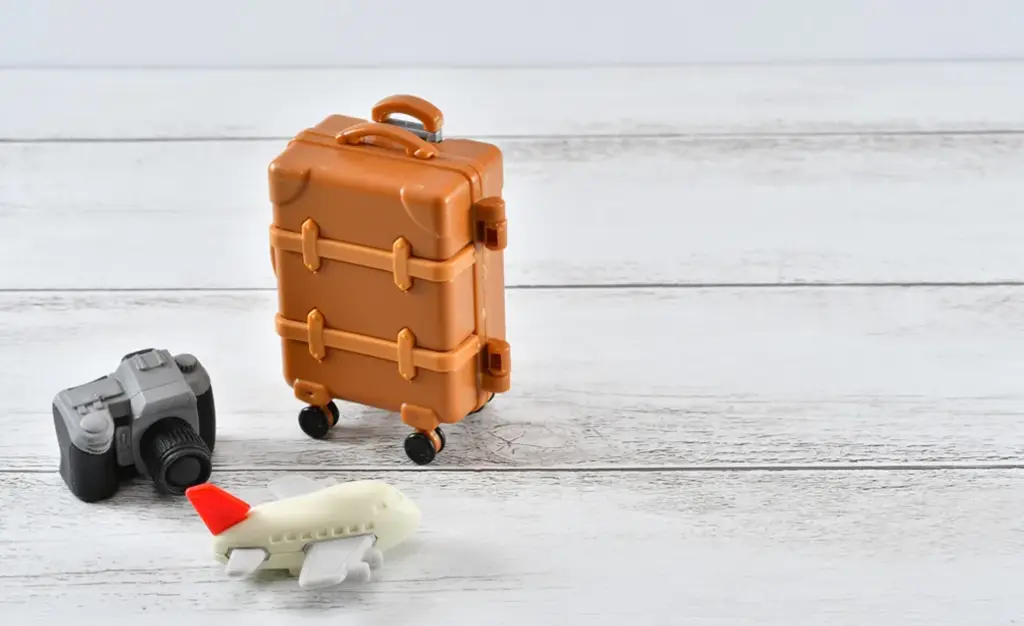
Emergency Contacts
Police: Dial 110 for assistance in case of crime, accidents, or other situations requiring police intervention.
Fire & Ambulance: Dial 119 for fires, sudden illness, or injuries that require emergency medical assistance.
※ In Japan, ambulance and fire services are free of charge.
※ If you can go to the hospital by yourself, please avoid calling an ambulance.
English-Support Emergency Hotline – “Japan Visitor Hotline”
📞Dial 050-3816-2787 for 24-hour assistance, including interpretation support during emergencies, guidance on medical institutions, and disaster information.
●「Japan Visitor Hotline」日本政府観光局 (JNTO)
https://www.jnto.go.jp/emergency/eng/mi_guide.html
X: https://x.com/JapanSafeTravel
●Japan Tourism Agency Website – Medical Institutions Accepting Foreign Patients (Japanese Version) https://www.mlit.go.jp/kankocho/topics08_00012.html
●Ministry of Health, Labour and Welfare Website – Medical Institutions Accepting Foreign Patients (Japanese Version)
https://www.mhlw.go.jp/stf/newpage_05774.html
What to Do If You Get Injured or Sick in Japan
For Minor Injuries or Illnesses
If you have a small cut, scrape, or a mild cold, visit a drugstore first.
Japan has many drugstores where you can buy over-the-counter medicine for minor symptoms, such as cold medicine, pain relievers, disinfectants, and bandages. Many stores offer medications with English labels, and you can ask the staff for assistance in choosing the right product.
Point: When explaining your symptoms, use simple English words like “fever,” “headache,” or “cut” for smooth communication.
●Pharmacies/Drugstores Near Izumisano Station
https://www.navitime.co.jp/around/category/poi?node=00005254&category=0206005
●Pharmacies/Drugstores in Izumisano City
https://www.navitime.co.jp/category/0206005/27213/
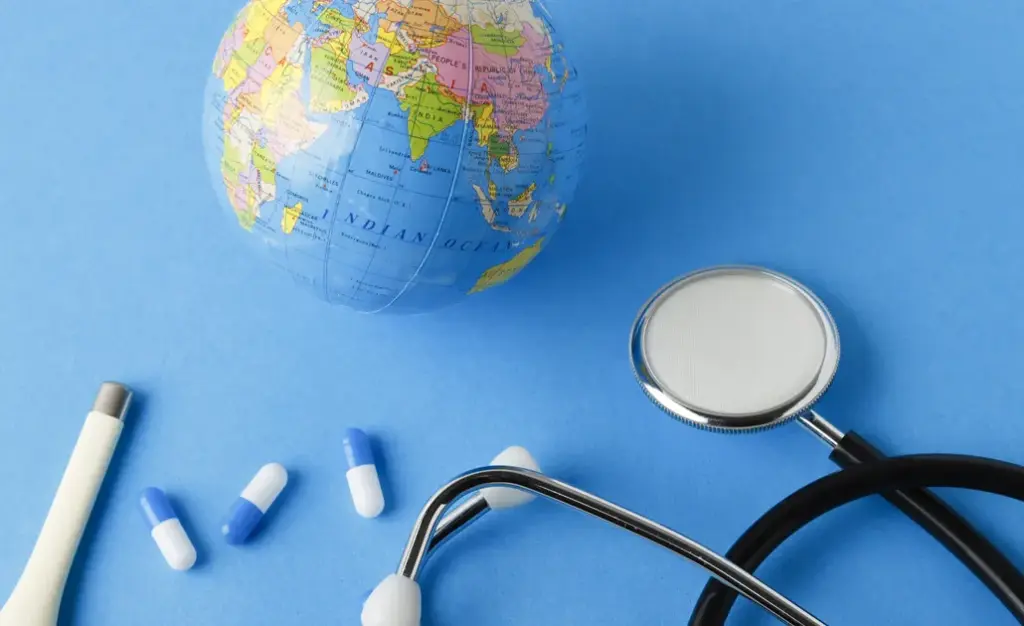
Visiting a Hospital or Clinic
If your symptoms are severe or cannot be managed with over-the-counter medication from a drugstore, it is recommended to visit a hospital or clinic.
<Steps to See a Doctor>
1.Find the Nearest Medical Facility
If you need medical assistance, ask at the local tourist information center or your hotel front desk for recommendations on nearby hospitals or clinics.
It is also helpful to research medical facilities that offer foreign language support in advance.
●What to Do When You Feel Unwell
https://www.jnto.go.jp/emergency/jpn/mi_guide.html
●Osaka Prefecture’s Medical Support System for Foreign Patients
https://www-pref-osaka-lg-jp-e.athp.transer.com/o100020/hokeniryokikaku/osakagaikokujiniryo/zigyouyougaikouzinn.html
●Rinku General Medical Center
http://www.rgmc.izumisano.osaka.jp/department/international1/
2.Present Your Insurance Card or Travel Insurance Documents
In Japan, if you do not have an insurance card, you will be required to pay the full cost of medical treatment out of pocket. If you have travel insurance, present your insurance card or proof of coverage at the medical facility.
★ Medical expenses in Japan can be expensive, so it is strongly recommended to purchase travel insurance before your trip. Most medical costs will be covered, reducing your out-of-pocket expenses significantly.
※ When filing an insurance claim after receiving medical treatment, you will need receipts and medical certificates issued by the hospital or clinic. Be sure to keep these documents.
●Travel Insurance Enrollment at Kansai International Airport
https://rs.kansai-airports.co.jp/business/insurance/inbound/
3.Language Support
Even at English-speaking hospitals, a translation app can help with communication.
Major cities like Tokyo and Osaka offer medical interpretation services for foreigners.
●Google Translate
https://apps.apple.com/jp/app/google-%E7%BF%BB%E8%A8%B3/id414706506
●VoiceTra
https://apps.apple.com/jp/app/voicetra/id581575230
●iTranslate
https://apps.apple.com/jp/app/itranslate-%E7%BF%BB%E8%A8%B3-%E9%9F%B3%E5%A3%B0-%E5%86%99%E7%9C%9F-%E3%83%86%E3%82%AD%E3%82%B9%E3%83%88%E3%81%AE%E7%BF%BB%E8%A8%B3%E6%A9%9F/id288113403
●Pocketalk (App Version)
https://apps.apple.com/jp/app/pocketalk/id1547101543
In Case of Emergency (Using an Ambulance)
If someone is unconscious, seriously injured, or in need of urgent medical attention, do not hesitate to call an ambulance.
- Dial 119.
- Say, “Ambulance, please.”
- Provide your location and a brief description of the condition.
(Example: “I am at [location]. He has a high fever.”)
🚑 Guide to Using Ambulances for Foreign Visitors – Fire and Disaster Management Agency (FDMA)
https://www.fdma.go.jp/publication/portal/post1.html
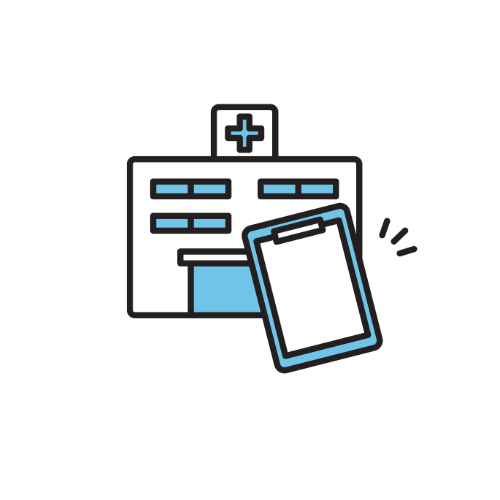
About Japan’s Healthcare System
Japan has a universal health insurance system, requiring all residents to join a public health plan. This reduces out-of-pocket medical costs to about 30%, allowing access to high-quality care at affordable rates.
Japan prioritizes comprehensive care, performing necessary tests and treatments to achieve the best possible outcome for patients. Unlike some countries that focus on minimal interventions, Japan emphasizes thorough medical treatment.
Before seeking medical care in Japan, research hospitals and insurance options in advance. Having travel insurance is highly recommended.

During Disasters (Earthquakes, Typhoons, etc.)
Japan experiences frequent earthquakes due to its many volcanoes and hot springs. If an earthquake occurs under the sea or near the coast, it may trigger a tsunami.
Earthquake intensity is measured on a scale from Shindo 1 (minor shaking) to Shindo 7 (severe shaking).
・At Shindo 5, objects may start falling.
・At Shindo 6 and 7, significant damage can occur, so take extra caution.
Useful Resources
●Latest Earthquake Information from the Japan Meteorological Agency
https://www.jma.go.jp/bosai/map.html#9/34.836/135.81/&elem=int&contents=earthquake_map&lang=en
●“Safety Tips” App – A free disaster information app supervised by the Japan Tourism Agency. It provides emergency alerts for earthquakes, tsunamis, and severe weather, as well as useful disaster response information via push notifications.
https://www.rcsc.co.jp/safety-tips-en
Apple Store:
https://apps.apple.com/jp/app/safety-tips/id858357174
GooglePlay:
https://play.google.com/store/apps/details?id=jp.co.rcsc.safetyTips.android&hl=ja
How to Respond During a Disaster
1.Evacuate to a Safe Place
・Earthquake: Take cover under a table or near a sturdy pillar.
・Typhoon & Heavy Rain: Move to higher ground or an evacuation shelter. Avoid rivers and the sea.
・Tsunami: Evacuate immediately to higher ground and stay away from the coast.
2.Stay Calm
・Take deep breaths to avoid panic and follow local authorities and those around you.
3.Gather Information
・Use your smartphone to check official updates from local tourist information centers via SNS or other official sources.
During Disasters (Earthquakes, Typhoons, etc.)
You can check the location of evacuation shelters at local government offices or municipal websites.
●Izumisano City Disaster Information
(Hazard maps, evacuation site information, etc.)
https://www.city.izumisano.lg.jp/kakuka/kyoudou/kikikanri/menu/bou/
●Emergency Preparedness MAP (Izumisano Disaster Prevention MAP)
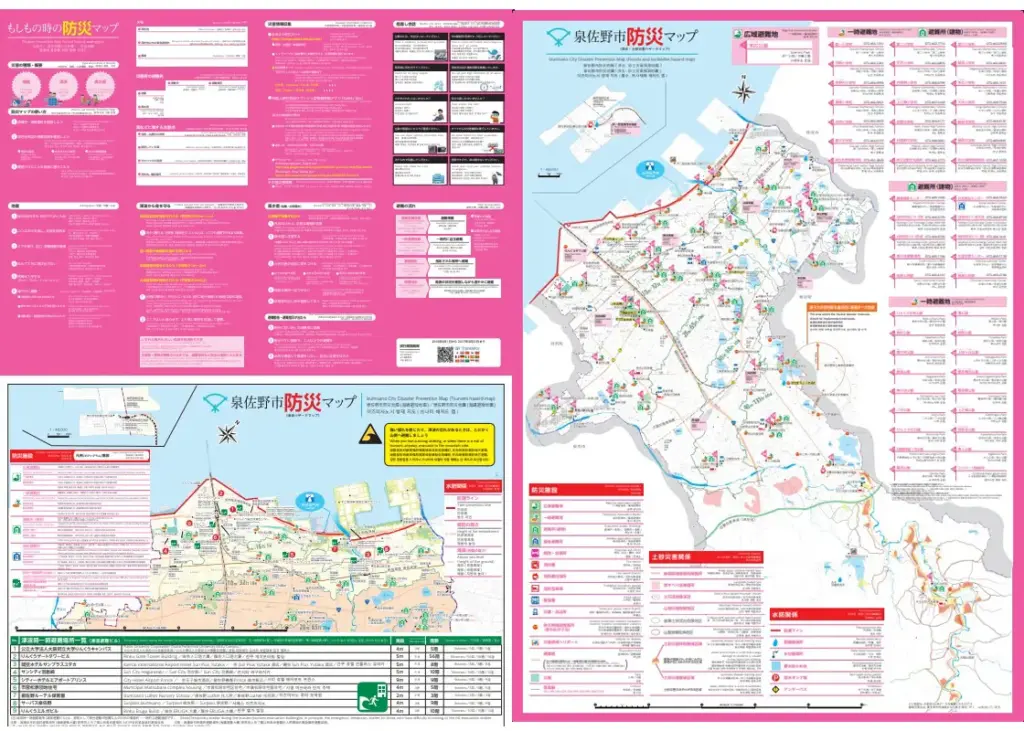
●Izumisano City Emergency Response
https://welcometoizumisano.com/emergency
●Osaka Disaster Prevention Network
(A comprehensive website for weather alerts, evacuation information, and other disaster-related updates)
https://www.osaka-bousai.net/
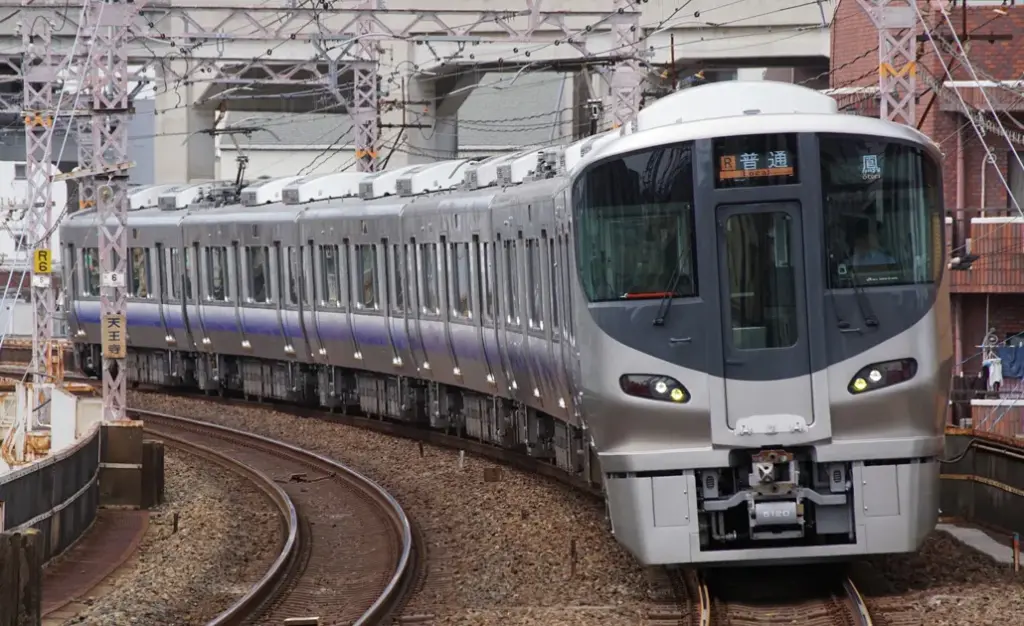
Public Transportation Information
You can check operation status on the official website.
●JR West Japan
https://www.westjr.co.jp/global/en/
●Nankai Railway
https://www.nankai.co.jp/en_railway
General Safety Information
Japan is a relatively safe country, but be mindful of pickpockets and unattended belongings. Always keep your valuables close and stay alert.
●Embassies & Consulates in Japan (Ministry of Foreign Affairs Website)
https://www.mofa.go.jp/about/emb_cons/protocol/index.html
日本を安心・安全に旅するために
Traveling Safely and Securely in Japan

